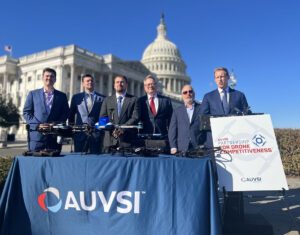AUVSI’s Partnership for Drone Competitiveness: Strengthening the US Drone Industry
 AUVSI’s Initiatives Aim to Boost U.S. Drone Industry and Level Global Playing Field
AUVSI’s Initiatives Aim to Boost U.S. Drone Industry and Level Global Playing Field
This week, the Association for Uncrewed Vehicle Systems International (AUVSI) took a significant step toward strengthening the U.S. drone industry with the launch of the Partnership for Drone Competitiveness (Partnership) and the release of an accompanying whitepaper. A Capitol Hill press conference took place, featuring key figures from AUVSI, American drone manufacturers, and bipartisan support from U.S. lawmakers.
AUVSI’s Partnership for Drone Competitiveness: Unveiling Strategies to Boost the U.S. Drone Industry
The Partnership, a coalition comprising AUVSI and US drone manufacturers aims to fortify the U.S. drone industry. Its core objectives include supporting a robust domestic drone industry, ensuring greater security for customers, establishing American leadership in advanced aviation, and leveling the playing field against foreign subsidized competition.
Senator Ted Budd (R-NC) emphasized the necessity of dominating the unmanned aircraft assistance market for national security and the well-being of American workers. Representative Dina Titus (D-NV-1) echoed the sentiment, highlighting the importance of incentivizing the domestic industry for efficiency and safety.

 Senator Mark Warner (D-VA) expressed support for the Partnership, acknowledging the need to address the growing use of drones and unmanned systems. He stressed the importance of manufacturing these systems domestically to ensure safety and security. Michael Robbins, Chief Advocacy Officer at AUVSI, commended the support from lawmakers, acknowledging the significant step taken towards securing the domestic drone industry:
Senator Mark Warner (D-VA) expressed support for the Partnership, acknowledging the need to address the growing use of drones and unmanned systems. He stressed the importance of manufacturing these systems domestically to ensure safety and security. Michael Robbins, Chief Advocacy Officer at AUVSI, commended the support from lawmakers, acknowledging the significant step taken towards securing the domestic drone industry:
When we launched the Partnership for Drone Competitiveness in September, we understood that a strong domestic industry represents a strategic imperative in the new era of strategic competition. We are grateful to have the support of Senators Budd and Warner and Representative Titus, as well as many other members of Congress, championing this issue on Capitol Hill. This week’s press conference demonstrates another significant step toward a strong and secure domestic drone industry to level the playing field against unfair trade practices by China. We look forward to working with Congress more to meet the growing demand from industry and government.
The press conference included discussions with lawmakers including Senators Tester (D-MT), Rick Scott (R-FL), and Marsha Blackburn (R-TN), covering legislative efforts: including the American Security Drone Act, the STOP Illicit Drones Act, and the Drone Infrastructure Inspection Grant Act. The discussions also touched on new initiatives, including enhanced drone tariffs against China, grant programs, the Department of Defense’s Replicator program, and supply chain constraints.
AUVSI Whitepaper Unveils Strategies to Strengthen U.S. Drone Industry
In conjunction with the press conference, AUVSI has released a whitepaper addressing the challenges faced by the U.S. drone industry in the wake of foreign-subsidized competition, particularly from state-sponsored Chinese companies. The paper underscores the urgent need for action to ensure the competitiveness, security, and innovation of the U.S. drone manufacturing sector. The paper is freely available and worth reading in its entirety: in very brief summary, the whitepaper outlines the key challenges facing the US drone industry and outlines specific remedies that lawmakers may employ to meet them. Among the proposals:
Federal Market Demand Programs:
“Programs focused on U.S.-made drone acquisition incentives, specifically grants, would signal to investors the market opportunity for U.S. drones, stimulating investment into U.S. drone and component manufacturing.”
- Federal Grants for First Responders:
- A new program is suggested to aid public safety agencies in transitioning from Chinese drones to U.S.-made solutions.
- Congress is urged to enhance existing federal grant programs for first responders, ensuring funds are not used to purchase Chinese-made drones.
- Drone Infrastructure Inspection Grant (DIIG) Act:
- A proposed legislation creating a $100 million grant program for local, state, and tribal governments to utilize U.S.-made drones for critical infrastructure inspection.
- The DIIG Act includes funding for workforce development programs, fostering the growth of a skilled workforce.
- DoD Programs:
- AUVSI supports the Department of Defense’s Replicator initiative, emphasizing the need for rapid and scalable production of autonomous systems.
- The Office of Strategic Capital is recommended to prioritize drones and drone components as critical technology, overcoming capital access challenges.
Enabling Regulations:
- Urging the Federal Aviation Administration (FAA) to streamline approval processes and minimize bureaucratic barriers to drone operational integration.
- Congress is called upon to provide additional tools, authorities, and resources to the FAA for successful integration efforts.
Drone Cybersecurity:
- AUVSI’s Trusted Cyber Program Working Group proposes the application of the Green UAS compliance program to assess and verify commercial drones for high levels of cybersecurity.
- Congress is encouraged to continue funding the Defense Innovation Unit’s Blue UAS program for connected drones.
Restrictions and Tariffs on Chinese Drone Imports:
- Advocating for rational, tailored country-of-origin restrictions, ensuring alignment with national security and human rights concerns.
- “Include affirmative measures supporting a timely transition, with grants or incentives to end users to foster a competitive and fair playing field for domestic manufacturers.”
AUVSI’s comprehensive approach, as outlined in the whitepaper, seeks to address the multi-faceted challenges faced by the U.S. drone industry. By advocating for specific policies and initiatives, AUVSI aims to secure the industry’s future, foster innovation, and promote fair competition on the global stage.
Read more:
Miriam McNabb is the Editor-in-Chief of DRONELIFE and CEO of JobForDrones, a professional drone services marketplace, and a fascinated observer of the emerging drone industry and the regulatory environment for drones. Miriam has penned over 3,000 articles focused on the commercial drone space and is an international speaker and recognized figure in the industry. Miriam has a degree from the University of Chicago and over 20 years of experience in high tech sales and marketing for new technologies.
For drone industry consulting or writing, Email Miriam.
TWITTER:@spaldingbarker
Subscribe to DroneLife here.


